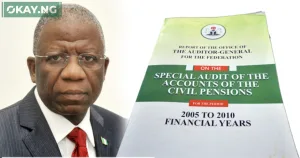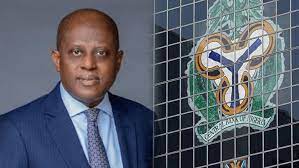You see, not everybody can make difficult decisions to move a challenged nation like Nigeria forward.
Many have criticised President Bola Tinubu for how the economy has turned out under his administration.
But, day after day, revelations continue to unfold to show how and why, we are where we are at the moment.

President Bola Tinubu is committed to reviving the economy of Nigeria and setting things straight.
He started by suspending and arresting the erstwhile Central Bank Governor, Godwin Emefiele.
Have You Read: Maritime Workers To Shut Down Port Over NLC Protest
Before that, he suspended the fuel subsidy regime that had been operational in Nigeria, for a very long time.
The Economic and Financial Crimes Commission (EFCC) has recovered some staggering amounts in naira and dollars from foreign exchange misappropriation at the CBN.
To continue this good work, Tinubu, on Monday, ordered the full execution of the Oronsaye report, after over a decade.
It is important to note that implementing the report, involves merging, scrapping, and relocating federal departments.
The Minister of Information and National Orientation, Mohammed Idris, gave a hint on the development on Monday after the Federal Executive Council meeting at Aso Rock Villa in Abuja.
Here are things to know about the report:
The Rationalisation and Restructuring Committee
- The Stephen Oronasaye committee was set up by President Goodluck Jonathan’s administration, in 2012. It was tagged the Presidential Committee on the Rationalisation and Restructuring of Federal Government Parastatals, Commissions and Agencies.
- The committee was headed by a retired federal civil servant and former Head of Service of the Federation, Stephen Oronsaye.
Stephen Oronsaye and his committee members painstaking carried out their assignment and came up with the following recommendations.
Oronsaye’s Committee Recommendations
The committee recommended that 220 out of the 541 existing government agencies be scrapped or merged.
- Implementing this means that no fewer than 102 heads of agencies and parastatals will lose their jobs.
- The committee recommended the reduction of statutory agencies from 263 to 161.
- It also recommended the abolition of 38 agencies, the merger of 52, and the reversion of 14 to departments in ministries.
- Oronsaye said that if the committee’s recommendation, was implemented, the government would be saving over ₦862 billion between 2012 and 2015.
Breakdown Of ₦862 billion To Be Saved
According to the committee about ₦124.8 billion that used to be spent on the abolished agencies would have been saved.
Also, about ₦100.6 billion would have been saved when the proposed merging of agencies is done. Another ₦6.6 billion would be saved from professional bodies.
Furthermore, Oronsaye Report proposed that with the merger, the government could save the ₦489.9 billion it spends on universities.
It will also save ₦50.9 billion on polytechnics; ₦32.3 billion on colleges of education and ₦616 million on boards of federal medical centres.
Other Agencies That Will Be Affected
The following agencies were proposed for merger by the committee,
- Economic and Financial Crimes Commission,
- Independent Corrupt Practices and Other Related Offences Commission,
- Federal Road Safety Commission.
- Nigerian Communication Satellite Limited,
- National Broadcasting Commission, and
- Nigeria Communications Commission in the area of frequency allocation.
You May Also Like: President Tinubu Speaks At ECOWAS Extraordinary Summit (See Full Text)
Also, the Universal Basic Education Commission, Nomadic Education Commission, and National Mass Literacy Commission are performing overlapping functions and should be brought under one body.
- The committee again believes NTA, FRCN, and VON should be under one management.
However, after the Oronsaye report, the White paper committee set up by Jonathan’s administration rejected most of the recommendations, while those accepted were not implemented.

